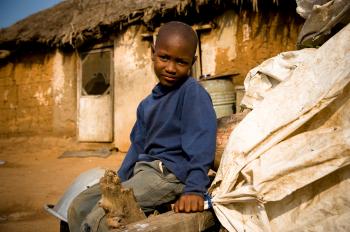Tema continues to be a socially divided city

Tema is located on the Atlantic coast of Ghana and has a population of roughly 300,000 inhabitants. It is Ghana’s most important seaport, and the city is also home to an oil refinery and other major industrial plants. Tema was originally built as a planned city in the 1950s and offered many modern amenities and services. From the 1960s onwards this attracted thousands of people from all over the country, arriving in search of employment and better living conditions. However, the city was unable to keep up with this influx of people, and adequate housing and other services could not be made available to everyone.
Today, the social divide is highly visible: right next to the planned city of Tema Township with its smoothly functioning infrastructure is Tema Newtown – the area where internal migrants settled in the past, and continue to do today. Tema Newtown has been referred to as Tema Township’s “poor cousin”, where infrastructure, adequate housing, sanitation, drainage and waste collection are not available. These precarious living conditions mean that thousands of parents are not able to provide for their families and there are countless cases of children engaging in labour activities, such as fishing, in order to contribute to the family income. These children usually do not attend school and it therefore becomes very difficult for them to find salaried employment as they grow older.
grow older.
Holistic and sustainable support for struggling families
The first SOS Children’s Village in Ghana was opened in Tema in 1974. Today, the SOS Social Centres in Tema provide a family strengthening programme to members of the local community in need of support. The programme ensures that children have access to essential educational, nutritional and health services. It provides guidance to parents in the areas of income generation and parenting skills and strengthens support systems for vulnerable children and their families within the community. Another integral component of the family strengthening programme is raising awareness of HIV/AIDS and providing assistance for affected people, for example with food, medicine, school scholarships, or setting up self-help projects. The social centres also provide day-care, ensuring that single mothers or working parents can leave their children in safe hands while they are out making a living. In addition, the SOS Medical Centre treats up to 1,500 members of the community each year who would otherwise not be able to afford medical treatment. The centre provides basic health services, such as treatment of infectious and non-infectious diseases.
What we do in Tema

For children from the region who are no longer able to live with their parents, 15 SOS families can provide a loving home. In each family, the children live with their brothers and sisters, affectionately cared for by their SOS mother
.
The children attend the SOS Kindergarten together with children from the local community. Classes are taught according to the Montessori Method and there is also a classroom for children with learning difficulties. The children then continue their primary and secondary education at the SOS Hermann Gmeiner Schools in Tema. In total, over 700 students attend the schools. We also run an International College for academically-gifted and highly-motivated students from all over Ghana, where students can obtain internationally recognised diplomas.
When young people reach an age where they feel ready to move out of their SOS home, the SOS Youth Programme makes shared accommodation available to them. This gives young people the opportunity to experience semi-independent living while supported by qualified counsellors.
One of our SOS Mother and Staff Training Centres is also located in Tema. Up to 230 future SOS mothers and co-workers receive comprehensive training here, in preparation for the important roles they will be taking on.
One of our SOS Mother and Staff Training Centres is also located in Tema. Up to 230 future SOS mothers and co-workers receive comprehensive training here, in preparation for the important roles they will be taking on.